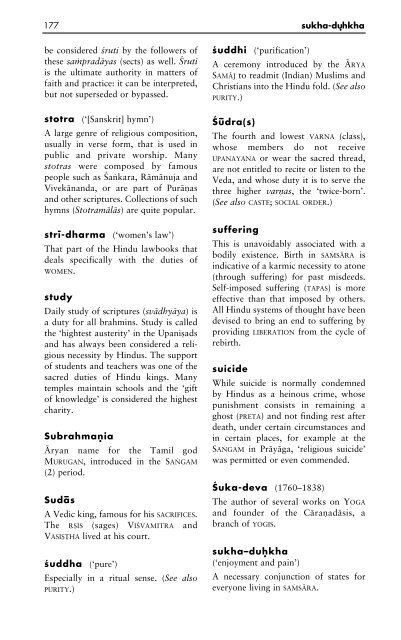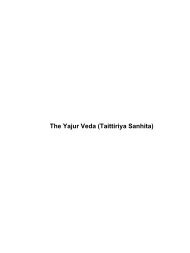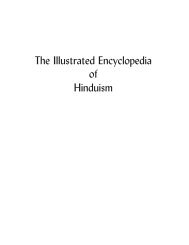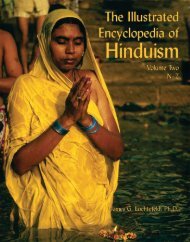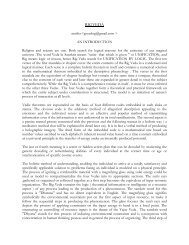A Concise Encyclopedia of Hinduism Klaus K Klostermaie
Create successful ePaper yourself
Turn your PDF publications into a flip-book with our unique Google optimized e-Paper software.
177 sukha-dụhkha<br />
be considered ÿruti by the followers <strong>of</strong><br />
these saƒpradäyas (sects) as well. Ÿruti<br />
is the ultimate authority in matters <strong>of</strong><br />
faith and practice: it can be interpreted,<br />
but not superseded or bypassed.<br />
stotra (‘[Sanskrit] hymn’)<br />
A large genre <strong>of</strong> religious composition,<br />
usually in verse form, that is used in<br />
public and private worship. Many<br />
stotras were composed by famous<br />
people such as Ÿaökara, Rämänuja and<br />
Vivekänanda, or are part <strong>of</strong> Puräæas<br />
and other scriptures. Collections <strong>of</strong> such<br />
hymns (Stotramäläs) are quite popular.<br />
strï-dharma (‘women’s law’)<br />
That part <strong>of</strong> the Hindu lawbooks that<br />
deals specifically with the duties <strong>of</strong><br />
WOMEN.<br />
study<br />
Daily study <strong>of</strong> scriptures (svädhyäya) is<br />
a duty for all brahmins. Study is called<br />
the ‘hightest austerity’ in the Upani•ads<br />
and has always been considered a religious<br />
necessity by Hindus. The support<br />
<strong>of</strong> students and teachers was one <strong>of</strong> the<br />
sacred duties <strong>of</strong> Hindu kings. Many<br />
temples maintain schools and the ‘gift<br />
<strong>of</strong> knowledge’ is considered the highest<br />
charity.<br />
Subrahmaæia<br />
Äryan name for the Tamil god<br />
MURUGAN, introduced in the SA¢GAM<br />
(2) period.<br />
Sudäs<br />
A Vedic king, famous for his SACRIFICES.<br />
The ØÆIS (sages) VIŸVAMITRA and<br />
VASIÆfiHA lived at his court.<br />
ÿuddha (‘pure’)<br />
Especially in a ritual sense. (See also<br />
PURITY.)<br />
ÿuddhi (‘purification’)<br />
A ceremony introduced by the ÄRYA<br />
SAMÄJ to readmit (Indian) Muslims and<br />
Christians into the Hindu fold. (See also<br />
PURITY.)<br />
Ÿüdra(s)<br />
The fourth and lowest VARŒA (class),<br />
whose members do not receive<br />
UPANAYANA or wear the sacred thread,<br />
are not entitled to recite or listen to the<br />
Veda, and whose duty it is to serve the<br />
three higher varæas, the ‘twice-born’.<br />
(See also CASTE; SOCIAL ORDER.)<br />
suffering<br />
This is unavoidably associated with a<br />
bodily existence. Birth in SAßSÄRA is<br />
indicative <strong>of</strong> a karmic necessity to atone<br />
(through suffering) for past misdeeds.<br />
Self-imposed suffering (TAPAS) is more<br />
effective than that imposed by others.<br />
All Hindu systems <strong>of</strong> thought have been<br />
devised to bring an end to suffering by<br />
providing LIBERATION from the cycle <strong>of</strong><br />
rebirth.<br />
suicide<br />
While suicide is normally condemned<br />
by Hindus as a heinous crime, whose<br />
punishment consists in remaining a<br />
ghost (PRETA) and not finding rest after<br />
death, under certain circumstances and<br />
in certain places, for example at the<br />
SA¢GAM in Präyäga, ‘religious suicide’<br />
was permitted or even commended.<br />
Ÿuka-deva (1760–1838)<br />
The author <strong>of</strong> several works on YOGA<br />
and founder <strong>of</strong> the Cäraæadäsis, a<br />
branch <strong>of</strong> YOGIS.<br />
sukha–duåkha<br />
(‘enjoyment and pain’)<br />
A necessary conjunction <strong>of</strong> states for<br />
everyone living in SAßSÄRA.


